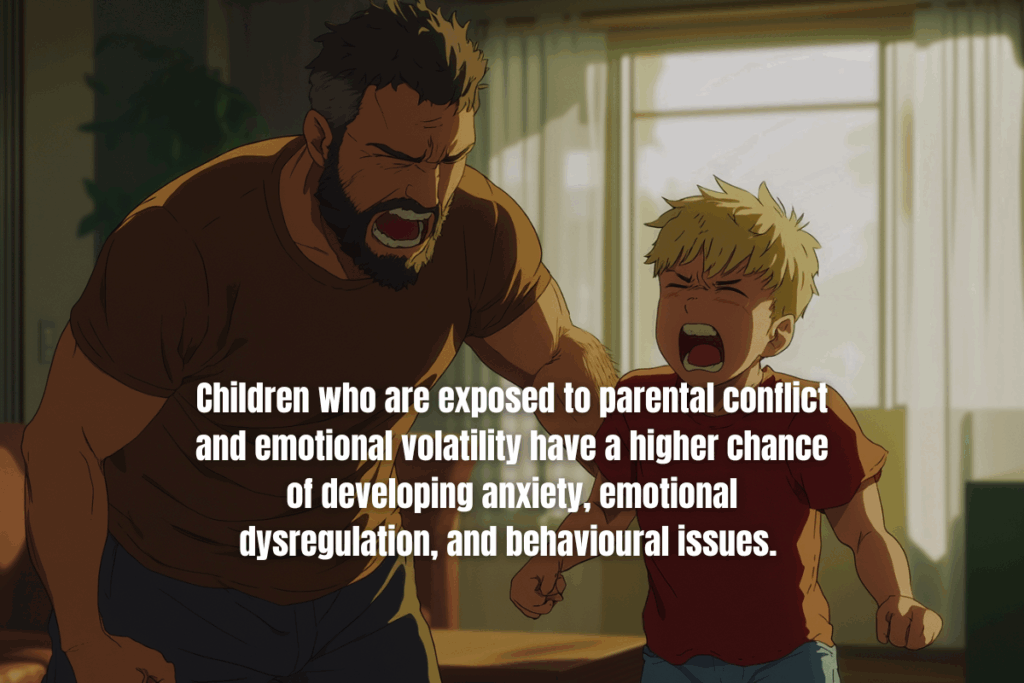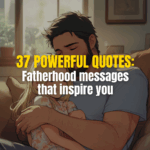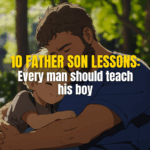Some of the most lasting memories our kids carry won’t come from vacations, birthday parties, or anything we buy them. They’ll come from the tone in our voice when we’re tired. From how we respond when they mess up. From the energy in the room when we walk through the door. This is where learning how to be a calm dad can create a long lasting relationship with your kids
I’ve had to learn, the hard way, that my kids don’t need me to be perfect. They need me to be calm. They need me to be mindful. Because when I lose control, they don’t just see it.
They feel it. And over time, they absorb it. And what’s worse, they can model my behaviours too.
The Real Impact of a Father’s Emotional Presence
It turns out, science backs this up in a big way.
A study supported by the Nuffield Foundation found that children exposed to high parental conflict, emotional volatility, and unpredictable home environments are significantly more likely to develop anxiety, emotional dysregulation, and behavioral issues throughout childhood and adolescence (Harold et al., 2016).
Another study from the University of Montreal discovered that exposure to hostile parenting (including yelling and verbal aggression) is linked to measurable changes in a child’s brain development — particularly in regions responsible for emotional processing and stress regulation (ScienceDaily, 2023).
In other words, how we show up emotionally in the home doesn’t just affect the mood. It affects the wiring. Our kids don’t just experience our outbursts. Their nervous systems respond to them. And those responses can shape their sense of safety, their confidence, and their emotional resilience.
Yelling Doesn’t Build Respect, It Builds Fear
I used to think raising my voice would teach discipline. What it actually taught was tension. But it’s also what I grew up with, and realized that modern fatherhood, and learning how to be a calm dad is so important.
Kids don’t hear the lesson when they’re afraid.
They hear, “I’m not safe right now.”
They shift into self-protection, not learning.
And when yelling becomes normal, our kids start adapting. Not in a healthy way, but in ways that keep them from being fully themselves.
They hold back their feelings.
They hesitate before asking for help.
They walk on emotional eggshells.
I don’t want my kids to see me as a ticking time bomb.
I want them to know they can come to me, even with their biggest mistakes, and not fear the fallout. This impacted me as a kid when I walked around on eggshells, not being able to communicate my feelings openly.

How To Be a Calm Dad and What It Means For Your Kids
When I stopped focusing on being right and started focusing on being grounded, everything changed.
Here’s what I’ve seen in my own family when I choose calm over chaos:
- A safer emotional environment, they know I’m not unpredictable
- More honest conversations, they’re not afraid to talk to me
- Fewer power struggles, because I’m not trying to win every moment
- A better version of me , one I’m proud for them to model
We often say we want our kids to be emotionally strong.
But they can only learn that by watching us practice it, especially in the messy moments.
Being calm doesn’t mean being passive.
It means choosing control over chaos.
It means knowing that when the storm hits, we can still be the anchor.
What Helps Me Stay Mindful (Even on Hard Days)
I still slip. I still lose patience.
But I’ve found a few small tools that help me realign before I lose control:
- Breathe before I speak. Even 5 seconds of silence can change the outcome
- Ask: “What does this moment actually require from me?” instead of reacting from ego.
- Reflect at night, where did I stay calm today? Where did I lose it? What can I try tomorrow?
- Be kind to yourself too. You’ll make mistakes and have bad days, we’re humans. But also realize this and apologize when necessary. And remembering you’re not perfect and try to improve daily.
Sometimes I also remind myself:
This isn’t about me winning the moment.
It’s about not losing the relationship.
And no, it’s not easy. Especially after a long day, after work stress, or when the house feels like chaos. But those are the exact moments that matter the most. Because that’s when my response becomes their emotional blueprint.
You Can Break the Cycle
If you grew up with yelling, shame, or emotional unpredictability, that doesn’t have to be your story anymore.
You can interrupt the cycle.
You can build something better, even if you’re still figuring it out in real time.
You don’t need to be perfect.
You just need to be consistent.
And when you mess up, and you will, own it. Apologize. Reset.
That moment of humility?
It’s just as powerful as the moments of strength.
Reflection Prompts:
- What would my child say it feels like to be around me when I’m angry?
- How would they describe my presence when they make mistakes?
- When was the last time I apologized for losing my cool? What did they learn from that?
Final Thought
Your child doesn’t need a perfect dad.
They need a dad who listens before he speaks.
A dad who holds space instead of holding grudges.
A dad who shows up, even when it’s hard.
Because when you are calm, their world feels safe.
And when they feel safe, that’s when they truly grow.





